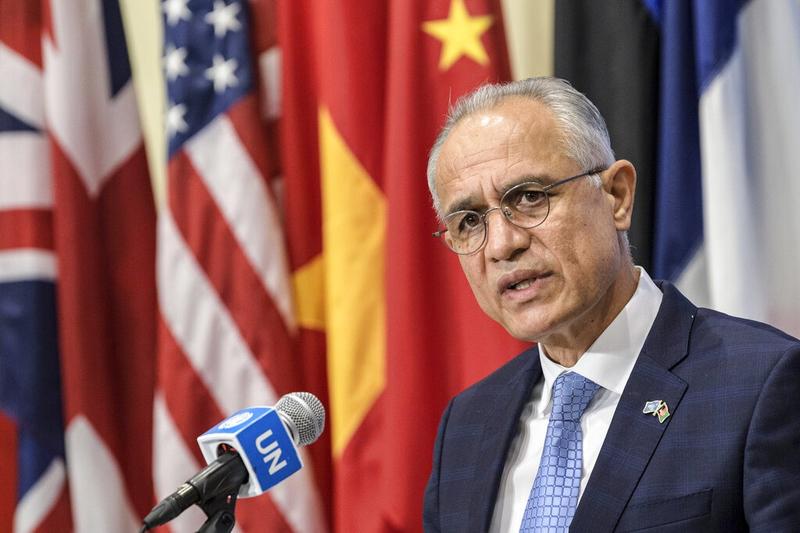 In this Aug 6, 2021 provided by United Nations Photo, Ghulam Isaczai, Afghanistan Ambassador to the United Nations, speaks during a press conference at UN headquarters. (MANUEL ELÍAS / UNITED NATIONS PHOTO VIA AP)
In this Aug 6, 2021 provided by United Nations Photo, Ghulam Isaczai, Afghanistan Ambassador to the United Nations, speaks during a press conference at UN headquarters. (MANUEL ELÍAS / UNITED NATIONS PHOTO VIA AP)
Though no speaker from Afghanistan could address the General Debate of the 76th Session of the United Nations General Assembly as scheduled, the Taliban government cannot be neglected for the sake of Afghan people, said state leaders, officials and experts at and outside UN.
Ghulam Isaczai, UN ambassador of the pre-Taliban Afghan government, withdrew his name from the list of speakers on Sunday though he was due to address the last day of the meeting on Monday.
Amir Khan Muttaqi, acting foreign minister of Taliban caretaker government, has asked to address the UN general debate and nominated their Doha-based spokesman Suhail Shaheen as Afghanistan ambassador to the UN. But the nomination has yet to pass the nine-member credentials committee, which include the United States, China and Russia.
Isaczai remains in the seat at least until the committee meets in the next meeting and makes a decision. He tweeted Monday that the withdrawal from speaking is "to preserve the national interests, preserve the seat of Afghanistan in the United Nations and to continue long-term cooperation with United Nations and Security Council on main issues."
READ MORE: Afghanistan a victim of US 'democracy trials'
“To my mind,” said Salman Bashir, former foreign secretary of Pakistan, “it is the state and the interim government in Kabul speaks now for the state”.
Imtiaz Gul, executive director of the Center for Research and Security Studies in Pakistan, also said it is legitimate for Taliban to ask to address the meeting as one cannot represent a country “if a government does not exist or is gone”.
The Taliban caretaker government deserves attention and engagement with other countries, according to speakers from several countries.
In a virtual address to the 76th session of the UNGA on Saturday, Pakistani Prime Minister Imran Khan urged the United Nations General Assembly to mobilize the international community to extend financial assistance to Afghanistan during the current crisis.
"If we neglect Afghanistan right now, according to the UN, half the people of Afghanistan are already vulnerable, and by next year almost 90 percent of the people in Afghanistan will go below the poverty line,” he said.
“There is a huge humanitarian crisis looming ahead. And this will have serious repercussions not just for the neighbors of Afghanistan but everywhere."
The Emir of Qatar, Sheikh Tamim bin Hamad Al-Thani, encouraged the international community to keep engaged with the Taliban in Afghanistan and support the people in the country, stressing the importance of “separating between humanitarian aid and political differences.”
“It’s also important to continue dialogue with the Taliban,” he said on the first day of the general debate. “Boycotting them would only lead to polarization and reactions, whereas dialogue could be fruitful.”
The Qatari emir’s speech was important because “it reiterated the emerging regional consensus that the Afghan Taliban leadership should be recognized, engaged and supported,” said Farhan Mujahid Chak, Associate Professor of Political Science for Gulf Studies at Qatar University.
He said the only potential obstacle is whether the regional and outside players sincerely cooperate with one another to stabilize Afghanistan, and not undermine each other's efforts.
It is crucial to prevent renewed violence, a humanitarian crisis, new refugee waves and a rapid descent into further instability, Chak said. He noted all of Afghanistan's immediate neighbors have achieved a broad-based consensus on how to move forward, and that includes separating politics from the humanitarian crisis in Afghanistan.
India Prime Minister Narendra Modi, in his address at the UN General Assembly on Saturday, also called upon the international community to help Afghanistan.
"World must fulfill its duty by providing help to the people in war-torn Afghanistan where women, children and minorities are in need," he said, adding it was imperative the country will not be used as a base to spread terror.
ALSO READ: Bolstering Confidence and Jointly Overcoming Difficulties to Build a Better World
It is impossible to achieve the political process in Afghanistan without the Taliban's cooperation, Russian Foreign Minister Sergei Lavrov on Saturday told a press conference at the UN headquarters in New York.
The Security Council resolutions have a need to advance the political process in Afghanistan, he said. Russia has moved “to facilitate the inter-Afghan reconciliation and inter-Afghan political process," he added.
Italian Foreign Affairs Minister Luigi Di Maio on Sunday urged foreign governments to stop a financial crash there that would trigger massive migrant flows, though he refused to recognize the Taliban government.
Abdul Qahar Balkhi, spokesman of Taliban Ministry of Foreign Affairs, has emphasized that Afghanistan wants to have friendly relations with the international community, including the neighboring and regional countries.
In a statement on Sunday, he said: "The Ministry of Foreign Affairs of the Islamic Emirate of Afghanistan welcomes recent decision by U.S. Treasury Department allowing U.S. government agencies along with international and non-governmental organizations and banks to facilitate flow of food and medicine to the IEA." The US issued the licenses on Friday.
Xinhua and agencies contributed to this report.
Contact the writers at vivienxu@chinadailyapac.com


